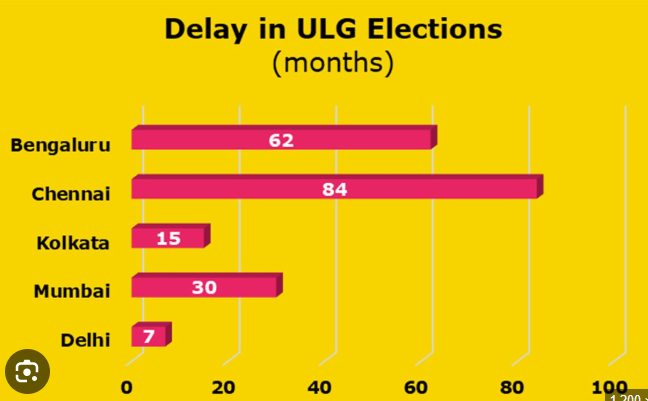Align local Body elections with Simultaneous Elections
Syllabus:
GS 2: Constitutional Amendments
Why in the News?
Recently high-level committee recommended aligning urban local government (ULG) elections with state and national elections, and highlighting the delays and challenges of ULG elections.
Introduction
- Urban Local Governments (ULGs) are important units in decentralized governance, ensuring public services and quality of life at the grassroots of India.
- Despite the provisions of the 74th Constitutional Amendment Act 1992 even now elections are not held regularly, there are still delays and inefficiencies.
- Strengthening ULG elections is crucial to support local democracy and boost India’s economic and social development.
74th Constitutional Amendment Act and ONOE
- Urban Local Governments (ULGs) are important executive bodies at the provincial level, responsible for providing public services and improving the lives of citizens.
- 74 Constitutional Amendment Act was enacted in 1992 to strengthen local self-government by providing constitutional recognition to ULGs.
- But more than 30 years later, the goals of this fundamental reform remain elusive.
- ULGs continue to face major challenges in carrying out their responsibilities.
- Ongoing dialogue on simultaneous elections, known as One Nation, One Election (ONOE), presents a unique opportunity for ULGs to highlight the importance of holding elections on time.
- Unfortunately, they are often ignored in broader ONOE discussions.
Exclusion of ULGs from ONOE discussions
- Report No. 79 of the Parliamentary Standing Committee on Law and Justice (2015) endorsed simultaneous elections to the Lok Sabha and Rajya Sabha but does not include elections to the Urban Local Governments (ULGs) of the State.
- Also, 2017 NITI Aayog discussion paper on the ‘Analysis of Simultaneous Elections’ excluded ULGs, saying these third-tier institutions comes under State subjects.
- They also discussed the impracticality of organizing elections across the country due to the large number of ULGs.
- Similar views were echoed in the 2018 draft report of the Law Commission of India.
High Level Committee (HLC)
- Departure from earlier reports, a high-level committee constituted by the Government of India suggested holding ULG elections within 100 days of simultaneous Lok Sabha and Rajya Sabha elections.
Significance of ULG elections
- India has more than 4,800 ULGs, covering about 40% of the population, which is expected to increase to 50% by 2050.
- Cities contribute more than 60% to India’s GDP that are essential for economic growth and social welfare.
- Election should be conducted regularly every five years to maintain democratic governance in urban.
Delays despite Constitutional mandate
- Constitution mandates that elections for Urban Local Governments must be held every five years.
- However, the delay in this election has become common issue.
- According to the Performance Audit Brief on Implementation of the 74th Constitutional Amendment Act issued by the Comptroller and Auditor General (CAG) in November 2024, elections were postponed in over 60% of ULGs across India.
- In many cases, delay lasts for many years.
- This delay undermines the principle of decentralization enshrined in the Constitution.
Impact of delay
- Untimely elections deprive citizens of elected representation, close avenues for voicing grievances and addressing development needs.
- Accountability suffers without adequate representation, as decisions are made that affect citizens without participation orientation.
- Timely elections are important not only for Parliament and State Assembly but also for any city to maintain the spirit of democracy.
Operational Delay after elections
- Even if elections are held, there are delays in the council. State governments often delay the first meeting of elected councils, which are mandatory to elect a mayor, chairperson and standing committees.
- A study by Janagraha found an average delay of 11 months in the formation of municipal councils in Karnataka after the announcement of election results.
- This places ULGs under the administrative powers of state governments, preventing elected representatives from managing local affairs, thereby defeating the electoral mandate given to them by the people.
Powerless State Election Commissions
- State Election Commissions (SECs) are the regulatory body for ULG elections.
- However, the important issue is powerlessness, which makes this election effective.
- CAG report found that out of 15 states examined, only 4 SECs have been empowered to demarcate ward boundaries, which is a crucial step in the electoral process.
Challenges in ward delimitation and reservation
- Ward delimitation and reserved seats are political issues with vital implications, often delaying ULG elections.
- CAG report noted that delays in the demarcation of ward boundaries by state governments or court cases related to reservation had delayed the ULG elections.
- Ideally, these processes should be overseen by independent agencies such as the SEC to ensure transparency and prevent political interference.
Need for broader reforms
- To address these challenges, a comprehensive analysis of the issues surrounding the selection of ULGs is required in a timely manner.
- Ongoing discussions on constituting elections at the national level should include reforms to strengthen SECs and improve ULGs election procedures.
Government’s take on reform
- Government of India has proposed to set up an Implementation Group to implement the recommendations of the High-Level Committee (HLC).
- In addition, consultations will be held across the country to discuss changes to ULG elections.
- It is hoped that these discussions will ensure that reforms are prioritized for regular, scheduled ULG elections, thereby strengthening local democracy and governance.
Conclusion
To promote accountability, empower citizens, and to deepen democracy at local level which is essential for sustainable urban development and economic growth municipal and local governments need to be elected from time to time.
Source: The Hindu
Mains Practice Question:
Critically examine the role of Urban Local Governments (ULGs) in India’s decentralized system of governance, and discuss the challenges they face in ensuring timely elections as the 74th Constitutional Amendment Act mandates.




